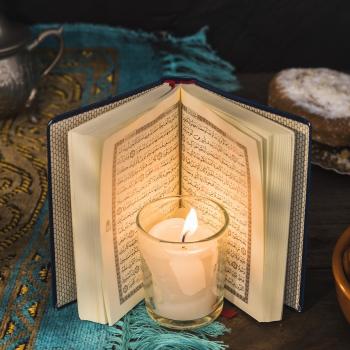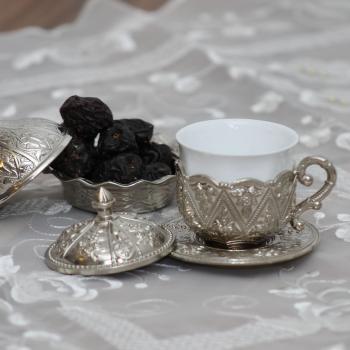 The eternal God: The First and the Last
The eternal God: The First and the Last
God is the only one who is eternal, un-created without a beginning or an end.
I am the Alpha and the Omega,” says the Lord God, “who is, and who was, and who is to come, the Almighty. Revelation 1:8
The eternal God is your refuge. Deuteronomy 33:27
…I am the First and I am the Last; apart from me there is no god.” Isaiah 44:6
The first part of the passage above is translated in Arabic as follows:
أَنَا هُوَ الأَوَّلُ وَالآخِرُ
To my readers who are able to read Arabic, these words will appear very familiar, as these are the same exact words used in the Qur’an.
He is the First (Awwal) and He is the Last (Akhir)… The Quran 57:3
God, the Praiseworthy
Surah Fatiha is the opening chapter, considered the heart and soul of the Qur’an and is recited in every unit of every Salah (prayer). It starts with the word “praise be to…”
All praise is due to Allah, the Lord of the Worlds …“You alone we worship, and you alone do we ask for help…” The Quran 1:2 & 1:5
You alone we worship/praise in the Bible
“He alone is your God, the Only one who is worthy of your praise, the One who has done these mighty miracles that you have seen with your own eyes.” Deuteronomy 10:21
God is Forgiving
Al Ghafoor and Al Ghaffar are the two attributes used for God’s forgiveness. Al Ghafoor not only means God forgives, but that he also conceals and protects (from sin). Al Ghaffar denotes repeated forgiveness, forgiving us again, and again and again.
Al Ghafoor is mentioned most commonly in combination with another attribute, most commonly (72 times) with, Ar Raheem, which mean Merciful, to emphasize that God forgives us out of His mercy. Another related attribute is Al Afuww which denotes forgiveness but refers to obliterating the blemishes, or the one who erases the sins, as in deleting it from the hard drive with no traces left!
Forgiving God in the Bible
The first verse combines ‘merciful and forgiving” just like the Quran does (or vice versa).
But the Lord our God is merciful and forgiving, even though we have rebelled against him. Daniel 9:9
The LORD is slow to anger, abounding in love and forgiving sin and rebellion. Yet he does not leave the guilty unpunished. Numbers 14:18
Most often attributes in the Quran:
 According to the Qur’an and the Bible, God is Almighty, All Powerful, the Judge, the Master and many other that reflects God’s Power and Might. However the most often repeated attributes in the Qur’an are Ar Rehman (The Most Kind, Gracious) and Ar Raheem (The Most merciful). Every chapter of the Qur’an, except one, starts with these two attributes. (In the name of God, the Most Kind, the Most Merciful). It is also found within the body of the chapters, not just in the beginning.
According to the Qur’an and the Bible, God is Almighty, All Powerful, the Judge, the Master and many other that reflects God’s Power and Might. However the most often repeated attributes in the Qur’an are Ar Rehman (The Most Kind, Gracious) and Ar Raheem (The Most merciful). Every chapter of the Qur’an, except one, starts with these two attributes. (In the name of God, the Most Kind, the Most Merciful). It is also found within the body of the chapters, not just in the beginning.
So even though we are often reminded of God’s anger, wrath and that ‘God is watching- you better be good or else…’, it is no accident that the Qur’an’s most often repeated attributes relate to God’s mercy and kindness.
A fact that gets lost on some overzealous preachers, trying to instill fear in the believers’ heart for obedience.
Ar Rehman and Ar Raheem in the Bible:
These attributes are frequently mentioned in the Bible as well.
…Return to the Lord your God, for he is Gracious and Compassionate, slow to anger and abounding in love, and he relents from sending calamity. Joel 2:13
… For you are God, Gracious and Merciful. Nehemiah 9:31
For the LORD your God is a Merciful God; he will not abandon or destroy you or forget the covenant with your ancestors, which he confirmed to them by oath. Deuteronomy 4:31
One and the same God?
This is a large topic and many books are written on this very topic, and one post cannot adequately address this sometimes complex topic. So I will cut to the chase (if I have already not done so).
The Abrahamic faiths generally agree that we worship the same God- God the creator of heavens and earth, and the God of Abraham.
The following is a verse that I often quote during my presentations to promote interfaith dialogue. I drive at least two take-home messages: First, when you argue with people of the book (typically meaning Jews and the Christians), we need to do this in the best manner. Secondly, we should highlight the similarities or what is common between us.
And do not argue with the People of the Scripture except in a way that is best, except for those who commit injustice among them, and say, “We believe in that which has been revealed to us and revealed to you. And our God and your God is one; and we are Muslims [in submission] to Him. The Qur’an 29:46
What’s in the name?
As we get caught up whether we should address God as Allah, Elohim, Elaha or by other names, the Qur’an frequently reminds us that they are all beautiful names (Asma- e husna)and we can call God with any one of them.
The most beautiful names belong to God; so call on Him by them. The Quran 7:180
Say, Call upon Allah, or call upon the Rehman (The Most Gracious): by whatever name you call upon Him (it is well): To Him belong the Most Beautiful names. The Quran 17:110
Time to Ponder
(Adapted from my book, The Three Abrahamic Testaments)
- If the Torah, the Gospel and the Quran refer to the same God, why do we not see the same name across all Scriptures?
- Does it make a difference if we call Him Allah, Elohim, Eloi or God?
- Does the Qur’an insist we call Him as Allah only?
- Does the Bible insist we call Him as Elohim only?
Share it on your social media by clicking on the icons in the upper left hand.












